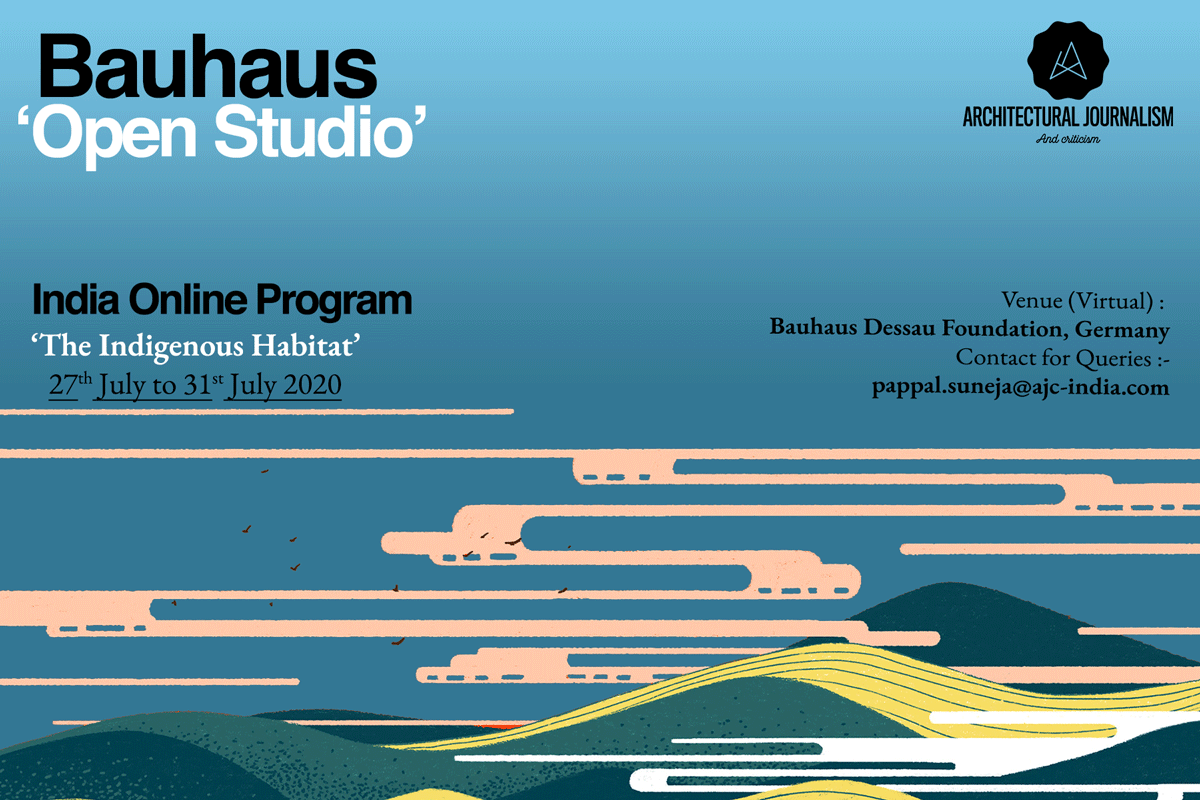Submitted by Pappal Suneja
Bauhaus “Open Studios" India Online Program scheduled from 27th to 31st July 2020 At Dessau, Germany
India Architecture News - Jun 11, 2020 - 09:51 5126 views

Note: The Bauhaus 'Open Studios' India Online Program, 2020 has been scheduled in July last week at Dessau, Germany. It is being primarily conducted for already registered entrants; however there are a few special invitee tickets available. For further information and queries, contact at [email protected]
"Bauhaus Open Studios" – Teaching Models – A Project of the Stiftung Bauhaus Dessau in Cooperation with "Architectural Journalism & Criticism Organisation, India" is scheduled Virtually from 27th – 31st July 2020 at the Bauhaus Building, Dessau. This program is in Collaboration with different Indian Universities through Architectural Journalism & Criticism Organisation; India founded by architect Pappal Suneja.
The theme of the 101th Year of Bauhaus Movement Celebration is 'Habitat'. Habitat (lat. habitare = to inhabit) approaches dwelling as a cultural practice and thus distances itself from the concept of the modern housing as a universally applicable ‘living machine’.
Following the same, this knowledge exchange program is based on 'Indigenous Habitat'. Pappal Suneja, Research Scholar at Stiftung Bauhaus, Dessau, Germany is appointed as the Project Coordinator for this program. He can be contacted at [email protected] for further details about the program and itinerary.
Concept Note: From breathing in caves to living in skyscrapers, we humans really deserve a pat on our backs. This journey is the result of our wheel of evolution. Architecture in relation with contextual approach has a great history, from caves to mud houses to brick houses and finally, to modern houses. Our human greed, to make a shelter that is more durable and appealing, has brought us to this point. Now, we are all geared up to learn and let our thoughts go wild and convert our imaginations into functional structures. Change in time calls for a change in our thinking, ideas, knowledge, and aspirations.
Like circus tents, buildings cannot be changed every now and then; it should have the ability to serve the activities of the generations to come. We could limit the size and further consider the decentralization of the same. This is absolute flexibility. Also, No two design problems can have exactly same solution. ‘Every Solution has a problem associated with it’ the focus should shift from ‘Finding and Designing’ the solution to first clearly understanding and defining the problem. There may not be a single solution to a given problem set; there may be a set of solutions and for every set there could be various alternatives to choose from. Now, it is important to note that what the source of solution is (is it coming from users, academicians, bureaucrats or a systematic public participation), what is the nature of problem to which the solution is addressed such as problem of a slum been converted into illegal colonies or problem of pollution and traffic congestion where intensity and impact change with time. Thus, the solution must be flexible enough to accommodate variables in the problems.
It is the time for a resurgence to explore a come back to the vernacular origins. Since the time when Interest for Architecture was on human agenda, habitation & shelter have evolved as an important part of our environment. It has a deep Anthropocenic relation to ecology and Habitat management. The pedagogical profile of the project shall involve the Design Interventions to call for a solution for a ‘real world’. The major philosophy to ‘recall’ shall be the mid-20th century design discourse on modernism and a newer understanding of vernacular habitat across the globe.
Project Team: ‘Open Studios’ India Program
Regina Bittner, Head of Academy
Katja Klaus, Research Associate
Lilo Viehweg, Research Associate
Philipp Sack, Scientific Associate
Pappal Suneja, Research Scholar & Project Coordinator
Top Creative © Saurav Bavalekar
